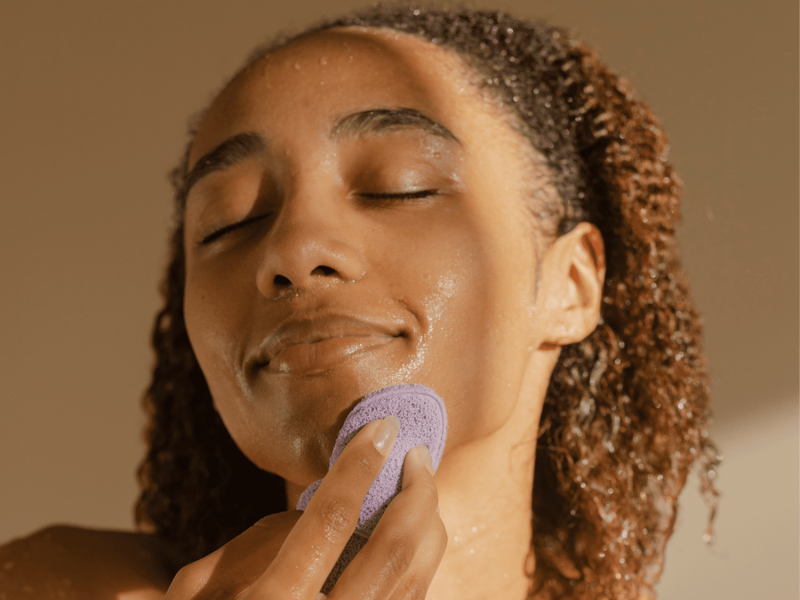
How to Prevent and Treat Over-Cleansed Skin The Final Takeaway
While some of us may believe that taking a “more is better” approach to skincare is the answer, this isn’t always the case, especially when it comes to cleansing. If you’ve been washing your face more than twice a day and notice that your skin is becoming red, dry, or irritated, you may be experiencing the effects of over-cleansing. Ahead, we tapped board-certified dermatologists to explain everything about over-cleansing—from how it happens to how to treat it.
What Is Over-Cleansing?
Over-cleansing can happen for a few reasons—from washing your face too frequently to using harsh products. Generally, washing your face more than two times daily is veering into the over-cleansing territory, but it depends from person to person, Dr. Rubin says. For example, someone with oily skin can tolerate cleansing more frequently. “I’m not a stickler about washing your face morning and night for the sake of a regimen,” Dr. Parikh adds. “[The most important thing is] cleansing while maintaining a healthy skin barrier.”
Dr. Parikh also says that the products you use to cleanse can have a significant impact, especially if the products lather too much and strip the facial skin of its essential layers. "If you use too much hot water or heavily foaming products, which tend to have irritating surfactants, you can over-cleanse your skin even if you only use them once daily," he says. "The key is not to irritate your skin for the sake of cleansing, as this can compromise your skin's natural, protective barrier."
Signs You’re Over Cleansing
According to our experts, some tell-tale signs and symptoms that you may be washing your face a bit too frequently include:
- Small patches of tiny red bumps around your eyes, mouth, and nose
- Itchy skin
- Redness
- Flaky skin
- Tight and dry skin
- Patches of eczema on your face or flaring of other inflammatory skin conditions
- Stinging and burning skin when applying skincare
The Effects of Over-Cleansing
"Over cleansing leads to skin barrier breakdown, which can cause [symptoms like] redness, inflammation, stinging and burning, tightness, flaking, and flaring of inflammatory skin conditions," Dr. Rubin says.
Another reason over-cleansing is problematic is that it can disrupt the skin’s natural oil production and pH levels, contributing to dry and irritated skin. “Of course, it feels great when you wash your skin and feel that tightness, but when you strip your skin, you challenge its ability to maintain homeostasis—the balance needed for healthy skin function and cell renewal,” Dr. Parikh says.
With cleansing, Dr. Parikh says the ultimate goal is to purify your skin without stripping it. He notes that skin dehydration can lead to inflammation, which you want to avoid. “Remember that over-cleansing leaves skin prone to inflammation and irritation,” Parikh says. “Inflammation is the core component of most skin conditions.”
How to Prevent and Treat Over-Cleansed Skin
To prevent over-cleansing, you’ll want to ensure you’re cleansing your skin once or twice a day with lukewarm water and a gentle cleanser. Cream cleansers like Cetaphil Gentle Skin Cleanser ($11) or oil cleansers such as Burt’s Bees Cleansing Oil ($15) are Byrdie-approved options.
However, Dr. Parikh says it’s important to note that there’s usually nothing wrong with double cleansing when you’re wearing makeup. “Start with a pre-cleanser like micellar water to remove makeup and excess grit and grime, and then follow up with your gentle, hydrating cleanser to wash your bare face,” he says.
After cleansing, Dr. Parikh and Dr. Rubin recommend limiting the use of exfoliants (they can irritate over-cleansed skin) and slathering your skin with hydrating skincare products to replenish your skin’s moisture levels. You should incorporate soothing serums, moisturizers, and masks into your routine.
The Final Takeaway
In general, cleansing your skin once or twice daily is perfectly fine. But if you start to experience signs of irritation, you may need to cut back on how often you wash your face and reassess the cleansers you use. Over-cleansing can interfere with your skin's pH and natural oil production, leaving you with dry, inflamed, irritated, or generally unhappy skin. So, it's best not to overdo it. If you're struggling with over-cleansing, consult with a board-certified dermatologist for further guidance.

